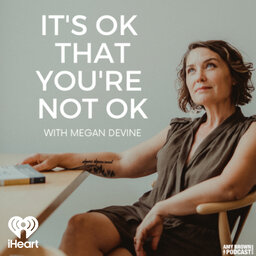More Anger Means More Joy: Part Two with Soraya Chemaly
What do we lose when we’re not allowed to be angry?
In a lot of ways, anger is more taboo than grief. They’re deeply related, as you’ll hear in this two-part episode: both grief and anger are considered “negative” emotions, things you shouldn’t feel, and definitely shouldn’t express in polite company. But what if reclaiming our anger was the way to build the world - and the relationships - we most want?
All of that and more with the best selling author of Rage Becomes Her, Soraya Chemaly.
In this two-part episode we cover:
- What is the right amount of anger?
- Why deciding some emotions are “good” and some are “bad” isn’t really helpful
- What would “anger competence” or “anger literacy” look like? (and why would you want that??)
- Why Soraya says “most grief is ambiguous grief”
- Is anger the most social emotion?
- How the old split between the head (logic) and the heart (emotion) cuts us off from what we most want
- Finding your best community by embracing your anger
About our guest:
Soraya Chemaly is an award-winning writer and activist whose work focuses on the role of gender in culture, politics, religion, and media. She is the Director of the Women’s Media Center Speech Project and an advocate for women’s freedom of expression and expanded civic and political engagement. A prolific writer and speaker, her articles appear in Time, the Verge, The Guardian, The Nation, HuffPost, and The Atlantic. Find her best selling book, Rage Becomes Her at sorayachemaly.com. Follow her on social media @sorayachemaly
Additional resources
We mention Pauline Boss in this episode. If you’re not familiar with her excellent work on ambiguous loss (a term she coined in the 1970s), check out her website at ambiguousloss.com
To read more about anger and how it relates to grief, check out It’s OK that You’re Not OK. If you want to explore your anger with creative prompts and exercises, check out the guided journal for grief, How to Carry What Can’t Be Fixed.
Get in touch:
Thanks for listening to this week’s episode of Here After with Megan Devine. Tune in, subscribe, leave a review, send in your questions, and share the show with everyone you know. Together, we can make things better, even when they can’t be made right.
For more information, including clinical training and consulting, visit us at www.Megandevine.co
For grief support & education, follow us at @refugeingrief on IG, FB, TW, and @hereafterpod on TT
Check out Megan’s best-selling books - It’s Okay That You're Not Okay and How to Carry What Can’t Be Fixed
In 1 playlist(s)
It’s OK That You’re Not OK with Megan Devine
Life is full of difficult things, from tiny everyday disappointments to life-altering events. Everyo…Social links
Follow podcast
Recent clips

Protecting Your Mental Health in the Healthcare Workplace, with the Burned Out Burnout Expert, Dr. Jessi Gold
37:29

Over and Over Again: Illustrator Aubrey Hirsch on the Power of Storytelling
39:19

Untangled: Suffering & The 8-Fold Path with Koshin Paley Ellison
1:02:51
 It’s OK That You’re Not OK with Megan Devine
It’s OK That You’re Not OK with Megan Devine